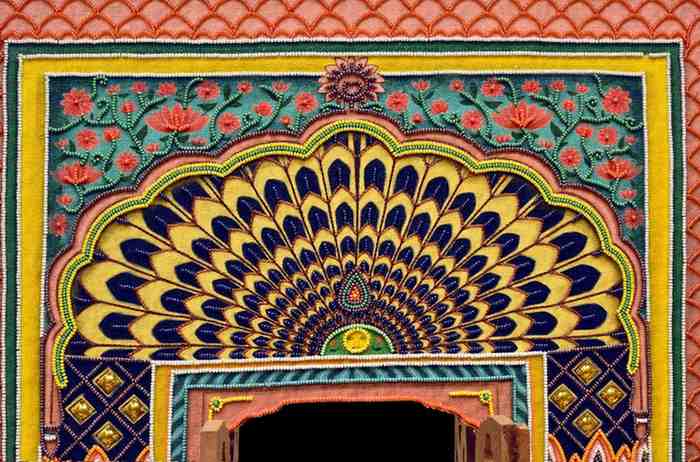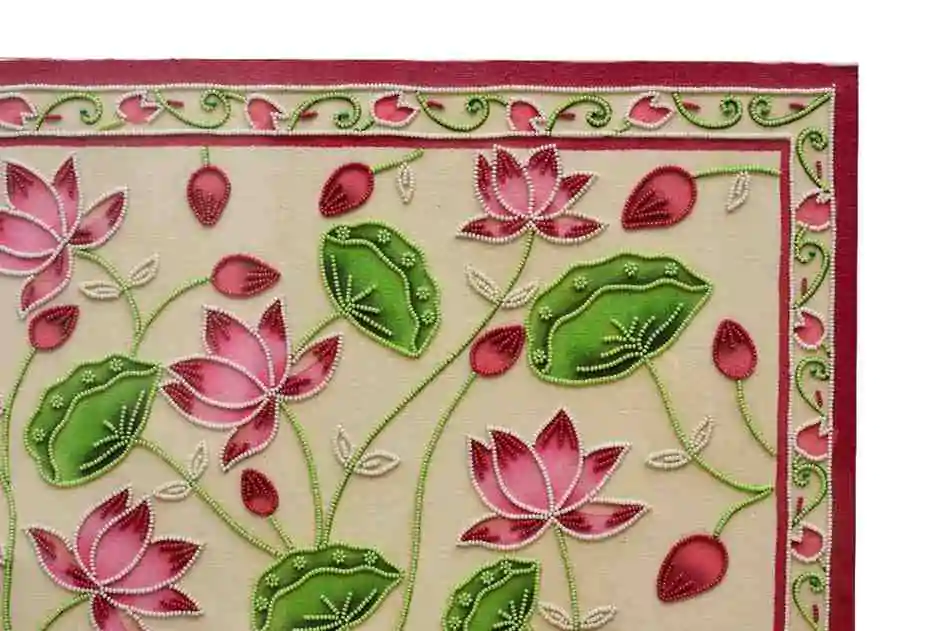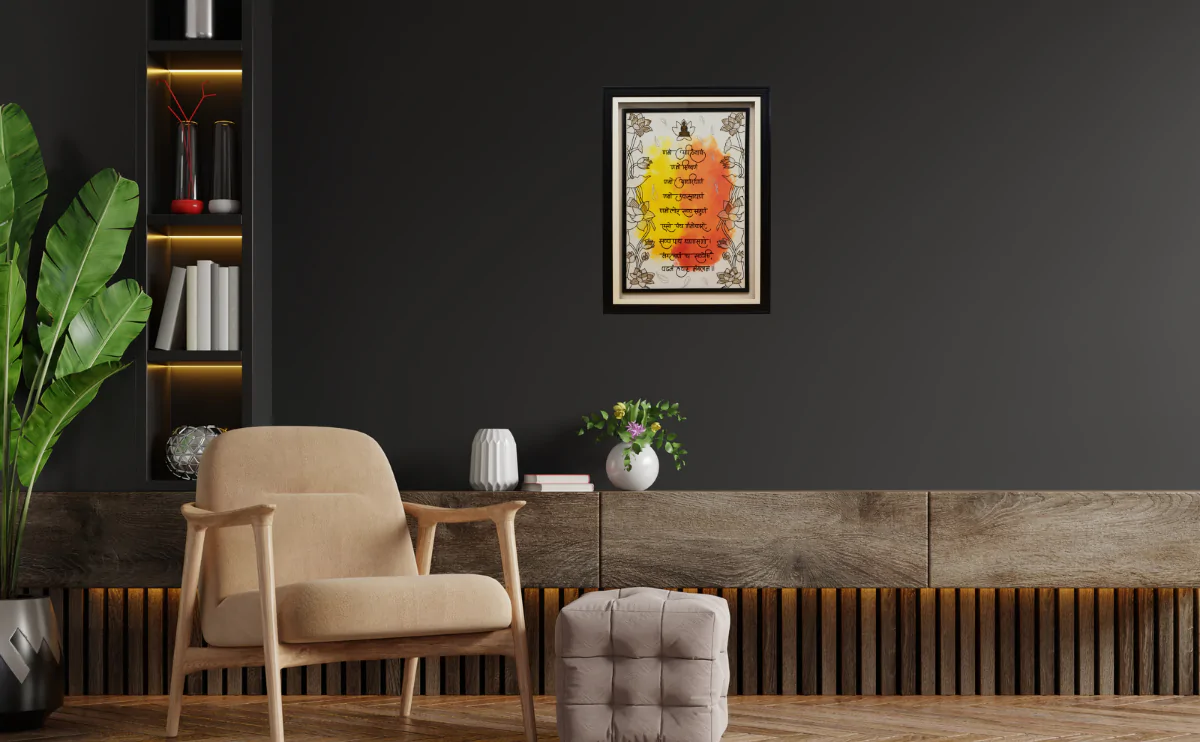Blog
Future of Handicraft: Responsible Consumption and Production

In today’s fast-paced digital world, where mass production and machine-made goods dominate the market, the charm of handicrafts still holds a timeless appeal. Handcrafted pieces are not just products; they are stories woven with tradition, culture, and sustainability. From embroidered customization services to handcrafted sculptures, handicraft continues to inspire conscious consumers who value authenticity over uniformity.
At Studio Ayni, we believe in bridging the gap between heritage and modern lifestyles. With offerings such as hand embroidery art frames, hand embroidery wall panels, and handcrafted art frames, we focus on promoting responsible consumption while preserving artisanal skills. This blog explores the future of handicrafts, how they align with sustainability, and why they are essential for responsible living.
The Importance of Responsible Consumption in Handicrafts
Responsible consumption isn’t just about buying less—it’s about buying smarter. In the handicraft industry, it means supporting local artisans, choosing handmade over mass-produced, and valuing the cultural significance of each product. For example, when you invest in hand embroidery art frames, you are not only buying home décor but also supporting generations of craftsmanship passed down through families.
With growing awareness about sustainability, conscious consumers are shifting toward eco-friendly and ethically sourced products. Handcrafted items like hand embroidery wall panels or handcrafted sculptures are often created using locally sourced materials, reducing environmental impact. This aligns perfectly with the global call for responsible production and mindful consumerism.
Hand Embroidery: A Blend of Tradition and Modern Aesthetics
Hand embroidery has always been celebrated as a timeless art. Today, with the rise of embroidered customization services, this craft is finding new life in personalized gifting and home décor. Whether it’s handcrafted art frames or wall panels adorned with detailed embroidery, the uniqueness of each piece reflects the patience and creativity of the artisan.

Modern homeowners and interior designers are increasingly turning to hand embroidery wall panels as statement pieces for their living spaces. Unlike factory-made décor, these panels add warmth, texture, and individuality to interiors. As people seek ways to express their identity through their homes, the demand for embroidered custom creations continues to grow.
Handcrafted Sculptures: Art That Lasts Generations
While embroidery enhances walls and textiles, handcrafted sculptures bring dimension, structure, and timeless beauty to homes and galleries. These sculptures are not only aesthetic but also culturally significant. They reflect traditions, beliefs, and stories unique to communities.
In today’s sustainable design movement, handcrafted sculptures are gaining popularity because of their durability and eco-friendly creation process. Unlike plastic or synthetic décor, sculptures made of clay, wood, or metal stand as symbols of authenticity. They are not disposable products; they are heirlooms that can be passed down to future generations, reinforcing the idea of responsible consumption.
Why Handicrafts Are the Future of Sustainable Living
The future of handicrafts lies in their ability to merge artistry with sustainability. Unlike mass-manufactured items, handcrafted products like hand embroidery art frames or hand embroidery wall panels encourage slow living—a lifestyle that emphasizes quality over quantity.
Additionally, the rise of embroidered customization services allows consumers to buy meaningful and personalized products, making them less likely to discard them. This shift not only reduces waste but also ensures artisans continue to thrive in a global market. At Studio Ayni, we envision a future where handicrafts play a central role in promoting responsible production and consumption.
The Role of Technology in Promoting Handicrafts
While handicrafts represent tradition, modern technology plays a significant role in taking them to a global audience. Online platforms and digital storytelling help artisans showcase their skills beyond geographical boundaries. For instance, handcrafted art frames and hand embroidery wall panels can now be purchased by customers worldwide with just a click.
Through digital marketing, customization requests have become easier. Consumers looking for embroidered customization services can directly connect with artisans, creating one-of-a-kind pieces. This synergy of tradition and technology ensures that handicrafts remain relevant in a rapidly evolving marketplace.
Supporting Local Artisans Through Conscious Choices
Every purchase has power. By choosing handcrafted over machine-made, you empower local artisans and preserve centuries-old traditions. The demand for hand embroidery art frames and handcrafted sculptures helps rural communities sustain their livelihoods.

Moreover, handicrafts often use natural materials, minimizing environmental harm. Whether it’s wooden handcrafted art frames or fabric-based hand embroidery wall panels, each creation contributes to a more sustainable future. Conscious consumption means not just buying products—it’s about investing in people, culture, and the planet.
Handicrafts as Personalized Luxury
One of the greatest strengths of handicrafts is their ability to offer uniqueness. In a world where everyone has access to the same machine-made products, owning something as unique as a hand embroidery wall panel or a customized embroidered frame feels like true luxury.
Personalization through embroidered customization services makes these creations even more meaningful. For weddings, housewarmings, or special occasions, gifting a handcrafted item adds a layer of sentimentality that mass-produced products simply cannot match. This uniqueness positions handicrafts as both sustainable and aspirational.
Challenges and Opportunities Ahead
Despite their timeless appeal, handicrafts face challenges in competing with cheap, mass-produced alternatives. However, increasing global awareness about climate change and sustainability is opening new opportunities. As more consumers seek out eco-friendly options, handcrafted sculptures, hand embroidery art frames, and customized embroidery services will only grow in demand.
The opportunity lies in educating consumers about the value of these creations—not just as décor or accessories but as sustainable lifestyle choices. Platforms like Studio Ayni aim to bridge this gap, highlighting the cultural and ecological importance of handicrafts.
Conclusion: Embracing Handicrafts for a Sustainable Tomorrow
The future of handicrafts is bright, rooted in responsible consumption and conscious living. From hand embroidery art frames to handcrafted sculptures, these creations carry the essence of culture, sustainability, and individuality. With rising interest in embroidered customization services and unique home décor, handicrafts are redefining modern lifestyles.
At Studio Ayni, we believe that every handcrafted product tells a story worth preserving. By supporting artisans and choosing products like hand embroidery wall panels, we contribute to a more ethical and eco-friendly future. Embracing handicrafts is not just about owning beautiful items—it’s about making mindful choices that respect tradition, artistry, and the planet.
